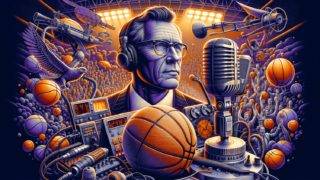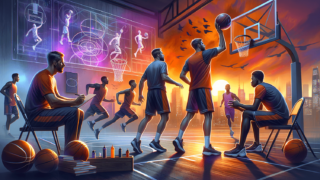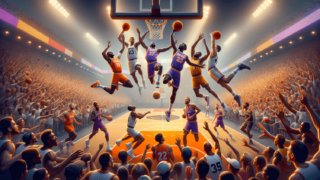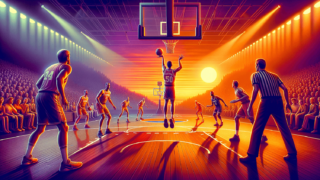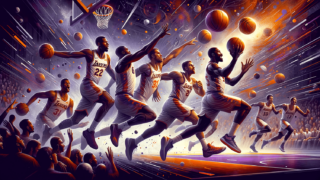
Impact of Social Issues on Basketball
Written by: Basketball Universe
Last updated:

Welcome to the vibrant intersection of sports and society! In this blog post, we’ll explore how social issues have made a slam dunk in the world of basketball, influencing the game both on and off the court. From the early days of racial integration to the ongoing fight for social justice, basketball has served as a remarkable platform for change, captivating the minds and hearts of fans along the way. So, lace up your sneakers, set the pick, and join us as we dive into the fascinating world of basketball and its enduring impact on social issues. Let’s break away from the defense and hit the open lane in this insightful journey!
Impact of Social Issues on Basketball
The impact of social issues on basketball is multifaceted, as it affects not only the players and teams but also the fans and broader community. Social issues drive conversations around diversity, inclusion, and equality which lead to increased representation and opportunities for players of various backgrounds. It also encourages players to use their influence as role models to advocate for positive change and address societal problems. Additionally, many NBA franchises have contributed to local communities through charitable endeavors, fostering connections between the sport and social causes. Overall, the impact of social issues on basketball has shaped the game’s cultural significance and growth while promoting important values and advocacy efforts.
Breaking Barriers: Racial Integration in Professional Basketball
The history of basketball is filled with stories of struggle and triumph, as talented players from all backgrounds fought to break down racial barriers in the sport. The integration of African-American athletes into the National Basketball Association (NBA) in the 1950s played a significant role in shaping the league and helped pave the way for future generations of players. As the first African-American player to be drafted, Chuck Cooper laid the groundwork for many others who challenged racial segregation in professional sports. His legacy continues to inspire aspiring athletes to strive for excellence both on and off the court.
The Emergence of the NBA’s Social Conscience
Over time, basketball players have become more than just entertainers; they have evolved into influential social figures who leverage their fame and resources to drive positive change in their communities. The likes of Bill Russell, Kareem Abdul-Jabbar, and Muhammad Ali focused on important causes, such as civil rights activism, while mentoring young players on the importance of social responsibility. The growth of a social conscience within the NBA initiated a culture shift, resulting in players using their voices to advocate for justice and equality wherever it was needed.
The Rise of Player Activism
In recent years, the NBA has witnessed a surge in player activism. High-profile athletes like LeBron James, Steve Nash, and Carmelo Anthony have spoken up on various social issues, including racial equality, education, and even gun control. They have also used their platforms to shed light on the experiences of underprivileged communities, driving meaningful conversations about issues that might have otherwise been overlooked. This steady rise of player activism demonstrates the powerful impact and influence that basketball players have in addressing social issues on a global scale.
Teams and Franchises: Understanding their Contributions to Local Communities
Beyond the individual efforts of players, NBA franchises have also contributed greatly to the positive impact of social issues on and off the court. Teams and organizations have focused on enriching their local communities by partnering with non-profits, schools, and other organizations to support social programs like education, health, and youth development. In doing so, they have fostered connections between their fan base and causes that benefit the community as a whole.
Charitable Efforts and Community Outreach
Many NBA teams have established philanthropic programs and initiatives that support a range of social causes. From hosting annual charity events, like the NBA Cares Season of Giving, to funding scholarships and youth sports organizations, it is clear that NBA franchises hold a deep commitment to driving positive change in society. These initiatives enable teams to give back to their communities, further solidifying the link between basketball and the broader social issues that affect people’s lives.
How Social Issues Shape Basketball Culture and Fandom
The impact of social issues on basketball extends beyond players and organizations to include the passionate and diverse community of basketball fans. The sport has brought together individuals from all walks of life, fostering connections built on a shared love for the game. Social issues have played a vital role in shaping the way these fans experience the sport as well as their relationships with one another.
Building a Global Community
Basketball has transcended borders, reaching millions of fans across the globe. As the game continues to evolve, it embraces diverse traditions, languages, and values, in parallel to how society continues to grapple with various social issues. This global community of basketball fans is built on the principles of inclusivity and respect, creating a rich and dynamic basketball culture that reinforces the sport’s capacity to unite people under a common cause.
Expanding Opportunities for Female Players and Fans
The growth and success of women’s basketball, both at the professional and amateur levels, is another testament to the impact of social issues on the sport. Efforts to promote gender equality and inclusivity have paved the way for talented female athletes to showcase their abilities on the court, inspiring countless young girls to take up the sport. With organizations like the Women’s National Basketball Association (WNBA) and the International Women’s Basketball Federation, the landscape of the game continues to evolve, empowering more women to be a part of basketball history and culture.
The Future: Harnessing Basketball’s Power for Change
As society continues to confront a diverse range of social issues, basketball’s role as a catalyst for change remains as relevant as ever. With players, franchises, and fans all contributing to the sport’s advancement, the future of basketball is brimming with potential for continued social impact.
Collaborating for Change
Looking ahead, the most significant impact of social issues on basketball will likely come from increased collaboration between athletes, organizations, and communities. By joining forces and leveraging the resources and influence of the basketball world, all stakeholders can work collectively to address pressing social concerns, such as climate change, mental health, and social justice. This collaborative approach will not only foster a sense of unity across the sport but also ensure that its future remains grounded in addressing the needs and challenges of society.
There you have it — an exciting exploration into the expansive impact of social issues on basketball. With a rich history of breaking barriers, forming a social conscience, and fostering a global sense of community, the sport has become more than just a game; it is a powerful platform for change. As basketball continues to grow and evolve, the interplay between the sport and the myriad social issues facing our world will only become more profound, standing as a testament to the persisting influence of the game we all love.
Empowering Leadership: Coaches and Executives as Agents of Change
Coaches and executives play a pivotal role in shaping the culture of the teams they lead, which in turn influences the impact of social issues on basketball. They are instrumental in fostering an inclusive environment that encourages players to not only excel in their skills but also engage in activism and community outreach. By embracing the importance of social issues, coaches and executives pave the way for meaningful change and growth both within the sport and beyond.
The Phil Jackson Effect
Phil Jackson, the legendary coach who led both the Chicago Bulls and Los Angeles Lakers to multiple championships, is a prime example of a leader who transcended his role in the sport. Known for his unorthodox and innovative coaching methods, Jackson encouraged players to embrace mindfulness, emotional intelligence, and self-awareness, which in turn helped them grow as individuals and better understand societal issues. By promoting a holistic approach, he cultivated a culture of open-mindedness that resonated both on and off the court.
The Role of Social Media in Amplifying Basketball’s Social Impact
With the ever-evolving landscape of technology and the rise of social media networks, basketball’s impact on social issues has ventured into digital territory. Players, teams, and fans now have accessible platforms to express their opinions, share stories, and collaborate on initiatives related to social causes. The virality and far-reaching influence of social media networks have paved the way for increased awareness, dialogue, and engagement around pressing issues.
Trending Hashtags and Viral Campaigns
Social media campaigns, such as #BlackLivesMatter, #TakeAKnee, and #HeForShe, have reverberated through the basketball community, allowing players and fans alike to voice their solidarity with social causes. These online movements have sparked conversations and inspired real-world action, whether it’s raising funds for disaster relief or advocating for policy changes. The endorsement and participation of basketball personalities in such campaigns further amplify their reach and impact.
Basketball as a Conduit for Diplomacy and International Relations
Basketball’s influence extends beyond the social sphere and into the realm of diplomacy and international relations. The sport has served as a bridge between countries, promoting cultural exchange and fostering understanding among people from different backgrounds. As tensions between nations dissipate on the basketball court, the sport emerges as a powerful symbol of peaceful collaboration and unity.
Basketball Diplomacy: The Ping Pong Diplomacy of the 21st Century
Occasionally referred to as the ‘Ping Pong Diplomacy’ of the modern era, basketball diplomacy is an emerging phenomenon that has witnessed prominent instances of political goodwill. For instance, the involvement of former NBA player Dennis Rodman in facilitating high-profile basketball games in North Korea helped shed light on social issues prevailing in the isolated nation. Moreover, international basketball tournaments and exhibition games have fostered cross-cultural understanding and exchanges that have the potential to improve relations between nations, demonstrating basketball’s unique ability to transcend politics and become an avenue for diplomacy.
Frequently Asked Questions
There may be a lot of questions bubbling up as you consider the impact of social issues on basketball. We’re here to help with a handy FAQ section. Read on for answers to some common questions that aim to further enhance your understanding of the intersection between social issues and the game of basketball.
1. How has basketball contributed to racial integration in sports?
Basketball has played a crucial role in breaking down racial barriers and paving the way for African-American athletes to excel both on and off the court. As early as the 1950s, players like Chuck Cooper, the first African-American draftee, challenged restrictive policies and replaced them with a culture of diversity and inclusion within sports.
2. Which players are considered pioneers of social activism in basketball history?
Some pioneers of social activism in basketball include Bill Russell, Kareem Abdul-Jabbar, and Muhammad Ali. These trailblazers used their stature and influence to bring attention to important social causes and inspire future generations of athletes.
3. What role do NBA franchises and teams play in contributing to social causes?
NBA franchises and teams contribute to social causes through community outreach efforts, partnerships with non-profits and schools, and supporting social programs such as education, health, and youth development. Philanthropic initiatives enable organizations to give back to their communities and foster connections with their fan base.
4. How does basketball foster a global sense of community?
Basketball transcends borders, reaching millions of fans across the globe. The sport embraces diverse traditions, languages, and values, and through inclusivity and respect, it creates a rich and dynamic basketball culture that unites people under a common cause.
5. How has the growth of women’s basketball impacted the sport’s inclusivity?
Women’s basketball’s growth and success have played an essential role in promoting gender equality and inclusivity. Efforts to create opportunities for talented female athletes have significantly influenced and expanded the demographics of basketball, integrating more women into the sport’s history and culture.
6. How do social media networks contribute to amplifying basketball’s social impact?
Social media networks provide accessible platforms for players, teams, and fans to express opinions and engage with social issues. By endorsing and participating in online movements, basketball personalities can amplify the reach and impact of social causes, raising awareness and inspiring action on a global scale.
7. Can you provide examples of basketball diplomacy?
Basketball diplomacy refers to instances when the sport serves as a conduit for diplomacy and international relations. Examples include Dennis Rodman’s involvement in high-profile basketball games in North Korea and international basketball tournaments that foster cross-cultural understanding and exchanges, improving relations between nations.
8. How do NBA players wield influence off the court to affect social change?
NBA players use their high-profile status, resources, and connections to advocate for social causes, empowering communities, and driving conversations around underrepresented issues. By leveraging their platforms, they elevate critical issues, inspiring discussions, and actions to instigate change.
9. In what ways are coaches and executives agents of change within basketball?
Coaches and executives shape the culture of their teams, fostering an environment that encourages social engagement, activism, and community outreach. By promoting inclusivity and social consciousness, they play a crucial role in guiding teams both on and off the court, shaping the sport’s impact on social issues.
10. What factors might contribute to furthering basketball’s impact on social issues in the future?
Increased collaboration between athletes, teams, organizations, and communities is a key factor in furthering the impact of basketball on social issues. Embracing technology and leveraging the power of social media to drive awareness and engagement around pressing issues will also help promote a collective and unified approach to addressing social concerns.
Featured Posts
- No pillar pages found.

